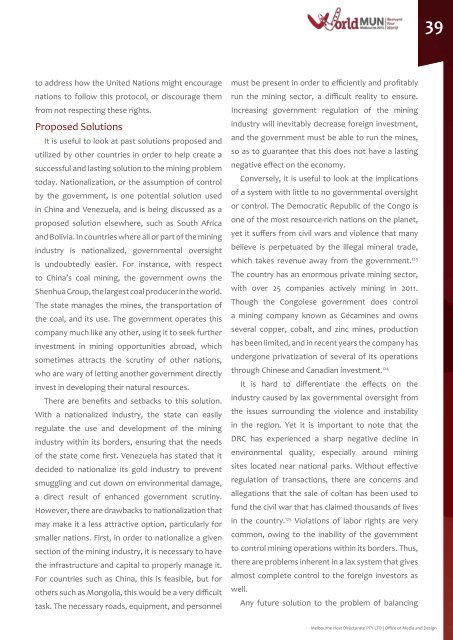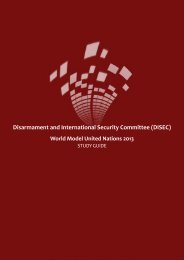SPECPOL - World Model United Nations
SPECPOL - World Model United Nations
SPECPOL - World Model United Nations
Create successful ePaper yourself
Turn your PDF publications into a flip-book with our unique Google optimized e-Paper software.
to address how the united <strong>Nations</strong> might encourage<br />
nations to follow this protocol, or discourage them<br />
from not respecting these rights.<br />
Proposed Solutions<br />
It is useful to look at past solutions proposed and<br />
utilized by other countries in order to help create a<br />
successful and lasting solution to the mining problem<br />
today. Nationalization, or the assumption of control<br />
by the government, is one potential solution used<br />
in China and Venezuela, and is being discussed as a<br />
proposed solution elsewhere, such as South Africa<br />
and Bolivia. In countries where all or part of the mining<br />
industry is nationalized, governmental oversight<br />
is undoubtedly easier. For instance, with respect<br />
to China’s coal mining, the government owns the<br />
Shenhua Group, the largest coal producer in the world.<br />
the state manages the mines, the transportation of<br />
the coal, and its use. The government operates this<br />
company much like any other, using it to seek further<br />
investment in mining opportunities abroad, which<br />
sometimes attracts the scrutiny of other nations,<br />
who are wary of letting another government directly<br />
invest in developing their natural resources.<br />
There are benefits and setbacks to this solution.<br />
With a nationalized industry, the state can easily<br />
regulate the use and development of the mining<br />
industry within its borders, ensuring that the needs<br />
of the state come first. Venezuela has stated that it<br />
decided to nationalize its gold industry to prevent<br />
smuggling and cut down on environmental damage,<br />
a direct result of enhanced government scrutiny.<br />
However, there are drawbacks to nationalization that<br />
may make it a less attractive option, particularly for<br />
smaller nations. First, in order to nationalize a given<br />
section of the mining industry, it is necessary to have<br />
the infrastructure and capital to properly manage it.<br />
For countries such as China, this is feasible, but for<br />
others such as Mongolia, this would be a very difficult<br />
task. The necessary roads, equipment, and personnel<br />
must be present in order to efficiently and profitably<br />
run the mining sector, a difficult reality to ensure.<br />
Increasing government regulation of the mining<br />
industry will inevitably decrease foreign investment,<br />
and the government must be able to run the mines,<br />
so as to guarantee that this does not have a lasting<br />
negative effect on the economy.<br />
Conversely, it is useful to look at the implications<br />
of a system with little to no governmental oversight<br />
or control. The Democratic Republic of the Congo is<br />
one of the most resource-rich nations on the planet,<br />
yet it suffers from civil wars and violence that many<br />
believe is perpetuated by the illegal mineral trade,<br />
which takes revenue away from the government. 123<br />
The country has an enormous private mining sector,<br />
with over 25 companies actively mining in 2011.<br />
Though the Congolese government does control<br />
a mining company known as Gécamines and owns<br />
several copper, cobalt, and zinc mines, production<br />
has been limited, and in recent years the company has<br />
undergone privatization of several of its operations<br />
through Chinese and Canadian investment. 124<br />
It is hard to differentiate the effects on the<br />
industry caused by lax governmental oversight from<br />
the issues surrounding the violence and instability<br />
in the region. yet it is important to note that the<br />
DRC has experienced a sharp negative decline in<br />
environmental quality, especially around mining<br />
sites located near national parks. Without effective<br />
regulation of transactions, there are concerns and<br />
allegations that the sale of coltan has been used to<br />
fund the civil war that has claimed thousands of lives<br />
in the country. 125 Violations of labor rights are very<br />
common, owing to the inability of the government<br />
to control mining operations within its borders. Thus,<br />
there are problems inherent in a lax system that gives<br />
almost complete control to the foreign investors as<br />
well.<br />
Any future solution to the problem of balancing<br />
39<br />
Melbourne Host Directorate PTY LTD | Office of Media and Design

















